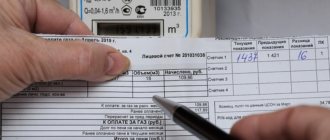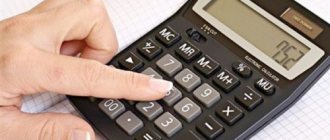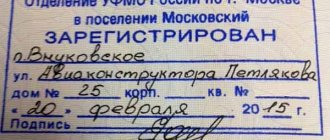Home/Utilities/Dependence of rent on the number of registered citizens
The question of whether the size of the rent depends on the number of registered people is asked by every owner who wants to register someone other than himself in his apartment. Indeed, if the answer is positive, each one registered can cost a hefty sum, especially taking into account current prices for public utility services.
What does the rent depend on?
In Art. 155 of the Housing Code of the Russian Federation states that every owner of real estate is obliged to pay for utility services no later than the 10th day of the month. The same law is also used in the process of settlement transactions in relation to payment for housing and resources provided by management companies and RSO. Practice shows that the amount of payments is commensurate with the number of services consumed. But sometimes there are no individual metering devices in the premises, so standards are established for each registered person, which are used when calculating the amount of rent.
Based on the above, it follows that the greater the number of people registered in the living space, the higher the monthly payment for utilities will be. It does not matter whether the registered persons have temporary registration or are permanently tied to the home. While their registration is current, the owner will receive bills with rent separately for all areas of services with the exception of a number of receipts (in the case of installed meters).
In practice, the total cost of rent depends on several parameters:
- quadrature (the number of square meters occupied by the apartment);
- tariff features of payment;
- number of registered persons;
- the fact of the presence of individual metering devices.
Indicators taken into account exclusively by the meter, if installed, are always applied. In this situation, payment is made for the amount of services consumed per month. However, some values are still calculated according to the number of people registered.
Direct dependency
Does the rent depend on the number of registered people in the apartment?
The total amount of rent directly depends on several factors:
- room area;
- rates;
- number of registered;
- availability of metering meters.
There are indicators that are always taken into account by the meter and paid for the volume spent during the month . For example, electricity. However, the number of people registered is important for calculating many indicators.
Find out on our website how many people can be registered in one apartment, what the risks and consequences of registering strangers are, and whether you need to pre-register in a new place.
Does the rent depend on the number of registered citizens?
The rent definitely depends on the number of registered people. In addition to rent, heating services are worth considering. If one citizen is registered in the premises, then he will receive a bill for a single person. If two, three, four, five are registered, then the amount of rent that was billed earlier will need to be multiplied by 2, 3, 4, 5, respectively. This applies to the following areas of utility services:
- gas;
- Electric Energy;
- cold water;
- hot water supply;
- water runoff;
- waste removal activities.
The following services, or more precisely, their cost, depend on the number of citizens who are officially registered in the apartment:
- electricity;
- gas supply;
- provision of water;
- removal of household waste.
This is stated in paragraph 2 of section. 2 of Resolution No. 354 of 05/06/2011. As for other payments, they do not depend on the number of registered citizens, i.e. they have a fixed amount.
What utilities depend on the number of people living in the apartment?
Following the calculations prescribed in Resolution No. 354, the following housing and communal services depend on the number of persons registered in one living space:
- electricity;
- gas;
- water supply;
- water runoff;
- garbage removal.
All other payments have their own fixed amount and do not depend on the number of registered employees.
For example, in one of the apartments in Moscow, only one person was registered - Inna Vasilievna. There were no water meters installed in her living space. She paid an average of 250 rubles for water every month. However, soon Inna Vasilievna registered her daughter Olga in her apartment.
Since Olga’s registration, water supply bills have averaged about 500 rubles per month, which confirms the direct dependence of the rent on the number of people registered in the living space. Consequently, if Olga wants to register her son (Inna Vasilievna’s grandson) in this apartment, then water supply payments will increase again.
Attention ! If the apartment does not have meters connected, then certain standards are established for each registered person, which are taken into account when calculating the rent.
If people are accustomed to saving and know how to do it so as not to overpay, then installing meters makes sense.
For example, a family of 4 lives in one apartment where special metering devices are not installed. They pay about 1,000 rubles for gas every month. A large family of 6 people lives in another apartment in the same entrance, and they have a gas meter installed. However, they are accustomed to using natural gas economically, and also purchased a special modern, economical gas stove. As a result, they receive monthly gas bills in the amount of about 800 rubles.
This is a prime example of how you can significantly save money by installing meters.
Normative base
The rent includes the amount that must be paid for the systematic provision of utilities. Its introduction is carried out on the basis of civil contracts, which are developed according to the classical scheme. Housing legislation imposes an obligation on apartment owners to regularly make payments for the use of utility services (Article 153 of the Housing Code of the Russian Federation).
Here is the main list of norms, laws and rules governing this point:
- Housing Code of the Russian Federation (Articles 155, 156, 158) - Federal Law No. 188 of December 29, 2004;
- by-laws – Rules for the provision of public services (government resolution No. 354 of 05/06/2011);
- Federal Law No. 261 “On Energy Saving” dated November 23, 2009
Please note:
In accordance with these standards, the responsibility for regularly paying for utility services rests with the owners and occupiers of real estate. At the very least, they are responsible for the timely repayment of debts.
Who should pay for housing?
According to Art. 153 of the Housing Code, either the owner of residential real estate or the tenant under a social rental agreement must pay receipts for the provided housing resources and services. Such tenants include persons living in non-privatized housing who have a share in the event of privatization, as well as citizens from among the beneficiaries who were provided with housing for social rent from the local municipality.
REFERENCE! Persons registered in the premises without ownership of a share of the real estate are not responsible for paying housing bills.
A personal account identifying the payer for utility services is created and linked only to the owners of premises in the house.
How is the share of each prescribed allocated?
The conditions for the provision of utility services are fully reflected in Chapter 2 of Resolution No. 354. The share of each registered person is determined by a calculation method. However, sometimes it is problematic to identify the actual volume consumed by each resident. Therefore, the owner faces difficulties in determining the amount of money that needs to be paid for a particular family member.
Attention
It should be understood that the calculation of the share of each registered person is carried out approximately, since exact measures in this case are impossible. It is necessary to use the total amount for each device as a basis and divide it by the total number of residents and registered people. This indicator will act as a share per registered person. If you want to act even simpler, you can divide the amount reflected in the receipt among all the people who are officially registered in the home.
If the premises are equipped with personal metering devices (meters), it is difficult to determine the consumption of light, water or gas separately by each resident. Therefore, the share parameter will be only conditional (approximate). A more accurate allocation of shares occurs in a situation where meters are not installed, and rent is subject to accrual in accordance with the standards for each registered person. The total amount of rent is determined in accordance with Federal Law No. 176 of June 29, 2015 and Art. 156 Housing Code of the Russian Federation.
Obligation to pay for housing and communal services
Art. 153 of the Housing Code of the Russian Federation states that citizens and organizations have a direct obligation to pay on time for housing and a number of provided utilities in full. Funds must be received separately from each resource provider. That is, separately for the enterprise that supplies gas, separately for the organization that supplies water, electricity, etc.
How is the calculation made?
The issue of charging for utilities is quite controversial. First of all, because prices for the consumption of housing and communal services in different regions of the country will differ. Most often, the calculation is per living person.
If meters are not installed in the residential premises , then fees will be calculated based on this norm. The list of such services includes electricity, sewerage, water supply, and gas. In this situation, the amount of payments will depend on the number of people registered at one address.
If meters are installed in the home , then charges for the use of these services will be formed based on the volume of resources consumed. There are a number of advantages to this. For example, by using water carefully or turning off the lights in a timely manner, you can significantly save on utility bills. In addition, it will be cost-effective to install special modern equipment equipped with functions to reduce water and electricity consumption.
In recent years, the practice of installing common heat meters at home has become quite common. These devices calculate the heat consumption of the residents of the entire house. The result obtained is later divided into the sum of residential and non-residential areas.
Every month, citizens receive receipts with the corresponding amounts to pay for the use of various utility services. There are cases when a person cannot independently understand them and carry out the calculations correctly.
If you have questions about utility bills, you can always seek advice from your management company. There you are required to give a comprehensive explanation of all components of the receipt and provide complete information on it. A housing and communal services lawyer will also help you, with whom you can consult on our website.
Moscow
Saint Petersburg
Free consultation
Moscow
Saint Petersburg
Who pays?
Suppliers of housing and communal services enter into an agreement with the housing office or with the responsible tenant. Further, all invoices for payment are addressed to him. Accordingly, it is the owner of the home who will be responsible for the debts incurred.
Each owner bears the responsibility for correctly dividing the final amount among all those registered and promptly demanding reimbursement of their share from them. It is very important that payments to the accounts of housing departments and suppliers are received on time.
If 6 people live in an apartment, a husband, wife, their parents and two children, but contracts with suppliers were concluded for the husband, then he will be required to pay the corresponding monthly bills. Whether he pays for everything himself, together with his wife, or splits the bills between himself and his parents is up to him to decide, but all payments must be received on the accounts of housing and communal services providers on time.
If such a payment system is inconvenient for residents, then they have the right to ask for the division of utilities for each of them personally. The division is proportional to the number of registered.
How is the share of registered people allocated?
Section 2 of Decree No. 354 states that the share of each person registered in a residential premises is determined by the calculation method . Practice shows that it is very difficult to establish the exact amount of utility bills consumed by each individual guest. This quite often causes difficulties for the homeowner on the way to determining the exact amount that each of those listed must pay.
The determination of the share of each person registered in the living space is not made precisely, but only approximately. The basis is the final amount for each counter, divided by the total number registered. The resulting figure is taken as a share per registered person.
It is only possible to more accurately calculate the share that falls on each person when meters are not installed in the apartment, and the rent is calculated in accordance with established standards. The total amount of the rent is determined by Art. 156 Housing Code of the Russian Federation.
Dependence of the rent amount on the number of registered persons
As already mentioned, if there are no meters, the number of registered people has a direct impact on the final amount required to be paid for the apartment. That is, if at first one person was registered in the apartment, and subsequently another one was added to him, the rent will be doubled (you can find out more about the structure of fees for housing and communal services in Article 154 of the Housing Code of the Russian Federation). Only the fee for the so-called “permanent” services will remain unchanged; the volume of provision does not depend on the number of people. This includes heating and home maintenance. The calculation in this case is made on the basis of quadrature (Articles 156, 157 of the RF Housing Code).
For your information
Other types of payments do not depend at all on the number of persons registered in the premises. Also, when meters are installed, rent payments no longer depend on the number of people with registration. As a result, the list of utility payments affected by this indicator is reduced. It is the responsibility of management company employees to explain the meaning of certain payments to residents. In any receipt there are “variable” columns, the values of which depend on the number of registered persons, and there are items that have constant values.
Ticketing
To understand how payments are calculated, you need to familiarize yourself with what and how monthly payments are made.
Services are divided into two main groups:
- Utilities. These include the supply of resources necessary for residents, which amount on average to 70% of the total amount in the receipt. Payment for a unit of consumed resource is made according to certain tariffs approved by the regional authorities. After the homeowner installs individual meters, the calculation will be made according to their readings. Based on meter readings, you can pay for utilities (water, electricity, gas, sewerage). Heating is paid based on the area of the apartment.
- Housing. The number of people registered in housing affects the amount of payment that is charged for the care and maintenance of general maintenance facilities. For example, elevator maintenance, cleaning and monitoring the condition of stairs, cleaning garbage chutes, garbage disposal, etc.
How is the calculation made?
The procedures for calculating rent are spelled out in detail in the Rules for the provision of rent - Resolution No. 354 of 05/06/2011. Much, in fact, depends not so much on the number of registered persons, but on the presence of individual accounting devices in the household. The total value also includes the cost of utilities for the general needs of the house.
IMPORTANT
In the case of personal metering devices, payment for utilities is carried out in accordance with their indicators. It is recommended to remove them from the 15th to the 25th monthly. Devices must be checked every six months. Residents are notified in advance of future visits from utility service representatives to inspect them.
If meters have not been installed, payment is made according to standards, the dimensional parameters of which are subject to determination by regional commissions. They depend on the following points:
- area of apartment property;
- the presence of certain household items - bathtubs, electric stoves, water heaters and boilers.
Recalculation can be carried out in a situation where there is a discrepancy between the readings of metering devices and the amounts paid, as well as in the absence of the payer from home for more than 5 days (Resolution No. 354 of 05/06/2011).
Calculation of payments
How is rent calculated: according to registered residents or residents? So, how is the rent calculated based on the number of people registered? There are average standards per person in each region.
They are established by law at the level of a particular region of Russia and are mandatory for everyone . They are taken into account when determining the cost of housing and communal services provided for each case per registered person.
How much do they pay for registration per person? The amount of payment for one person directly depends on the standard established by the constituent entity of the Russian Federation within whose borders the property is located.
The owner has the right to change the payment system for certain indicators. For example, having installed meters for gas and water, you will have to pay for these resources based on consumption, and not based on the number of people.
How much does the rent increase when a person registers? When registering a new person in the living space, the rent will increase in any case .
However, it will not increase completely, since there are payments that are calculated according to meter readings and the corresponding tariffs or according to the size of the living space.
If meters for hot and cold water and gas are not installed, then the number of persons assigned to the apartment will significantly affect the payment of utilities.
You can find out how to register in a village or village, at a dacha or in a garden partnership (SNT), in a communal apartment or in a dormitory, as well as whether it is possible to register in an apartment and a loft from our articles.
Rates
The price list depends on the specific type of service and region. Let's consider each of them in more detail based on data for 2021 - the first half of 2021 for most regions and territories of the Russian Federation.
| Water (cold and hot, respectively), rub./cubic m | Gas (minimum and maximum, respectively), rub./cubic. m | Light (minimum and maximum, respectively) rub. /kW |
| 33 rub. 3 kopecks, 143 rubles. 76 kop. | 4,277 – 6,062 | 2.37 – 5.38 for houses with gas stoves |
Water
The cost depends on several factors:
- collection method;
- energy costs for this process;
- cleansing technique;
- the cost of operating pipelines;
- expenses for issuing salaries;
- heating.
Before calculation, provisions such as conducting transactions in ruble currency and including a nominal price in the rate are taken into account.
Gas
The cheapest gas is in the Chelyabinsk region, the most expensive is in the Altai Territory. Average rates around 4 rubles are set in the Nizhny Novgorod, Novosibirsk, Omsk, Sverdlovsk, and Tyumen regions. Indicator 5 r. for 1 cubic meter or more is observed in the Volgograd region, Bashkiria, Moscow, Saratov regions, r. Tatarstan, Stavropol Territory. The most expensive tariffs are observed in the Altai and Krasnodar territories.
Light
The tariff marking for electricity is regulated by Federal Law No. 261 “On Energy Saving” and numerous regional acts. The cheapest electricity services are observed in Krasnoyarsk, Saratov, Volgograd, Yekaterinburg, Izhevsk, Novosibirsk. The highest cost of light is in St. Petersburg, Moscow, Krasnodar, Volgograd.
Attention
Regulation of electricity tariffs is carried out at the regional level and is regulated by local acts, resolutions, regulations and orders, the names of which vary.
Who should pay the rent?
Absolutely all service providers are involved in concluding agreements with housing companies or directly with owners. On their basis, responsibility is assigned to the owner of the premises (Article 153 of the Housing Code of the Russian Federation). Therefore, each property owner undertakes to monitor the receipt of the required amounts into the management account. In addition to this, the obligation to pay rent rests with other persons:
- tenants (if a formal agreement is concluded);
- other registered persons (relatives and family members).
Although the payment is always issued and sent to the post office in the name of the legal owner of the home. And when the bills are split, it comes to several people.
Who pays the utilities?
After residents have figured out how the number of registered residents affects the rent, it is necessary to determine who should pay for utilities. This obligation is defined by law, and according to Article 154 of the Housing Code, both the owner and other legally capable persons registered in the apartment must pay for maintenance, major repairs and other household services.
Interesting! If disagreements arise about the amount of utility bills for each registered person, you can enter into an agreement on the division of charges in court.
When housing is in social rent, the responsible tenant registered there is obliged to pay all utilities. Other persons registered there are not required to pay unless there is a separation of bills and an agreement on separate payment of utility bills is not concluded.
If registered persons refuse to pay rent
The Housing Code provides 3 main directions on how to force people registered in an apartment to pay fees:
- section of personal accounts (for relatives);
- threat of termination of registration;
- filing a claim in court (for tenants).
Note:
If you contact the fiscal authorities, the judge will oblige you to fulfill debt obligations if the owner provides evidence of the fact that there is no payment. This can be done by paying for the CG out of your own pocket and showing a document stating that you had to do it yourself.
How to force registered persons to pay?
How to force a registered person to pay utility bills? What to do if the registered person does not live and does not pay? The first way is to negotiate . If this cannot be done, then you can split the bill.
This method is suitable if relatives live together . However, if those who rent housing refuse to pay, the owner can evict by terminating the contract.
If all else fails, then the issues are resolved in court, up to and including depriving the defaulter of the right to use the apartment.
Only a stranger can be evicted by a court decision ; it is better to resolve the issue with a relative at the stage of discussion and a peace treaty.
Thus, there are items from the receipt for housing and communal services that are in no way related to the number of registered ones. However, there are also payments calculated solely based on this indicator.
If no one lives
Often, caring parents purchase housing for their growing child. It remains empty for a long time, waiting for its owner, although a child may already be registered there. In this situation, it is unlikely that you will be able to avoid making payments at all. After all, heating and maintenance of housing will be carried out by public utilities in any case. The only way out is to install meters for gas, electricity, and water. Since there will be no consumption of the resource, no payment will follow. And the remaining services will have to be compensated in accordance with Art. 153 Housing Code of the Russian Federation.
If no one is registered
Sometimes there are situations when a person is registered in one apartment, but lives in another. In order to pay utilities exclusively for those people who actually live in the apartment, although they are not registered in it, it is necessary to obtain a certificate of place of residence. In this case, the fee will be increased not for the “unowned” apartment, but for the actual place of housing. Along with this, it is required to write an application to the management companies, after which payments will be received in edited form. Providing such a certificate is required once every six months.
Special cases
If no one is registered in the residential premises, then payment for services calculated according to the standard “for each registered person” is not charged. At the same time, the payment for both supplied and actually consumed services is fully retained.
Payment for a premises with zero registered persons includes heating costs in full, since they are charged for heated square meters, as well as payment for general house expenses and needs.
Payments for registered but non-resident persons are charged in full, since they are calculated not by how many resources were consumed, but by the number of residents. If a tenant registered in the premises actually lives in another living space where he has temporary registration, he can reduce the rent at the place of registration by presenting a certificate of residence from the new place of residence.
In this case, during the period of residence of this tenant in another territory, the owner of the apartment will have his rent reduced for each service, calculated according to the standard per person, for the entire period of his absence.











